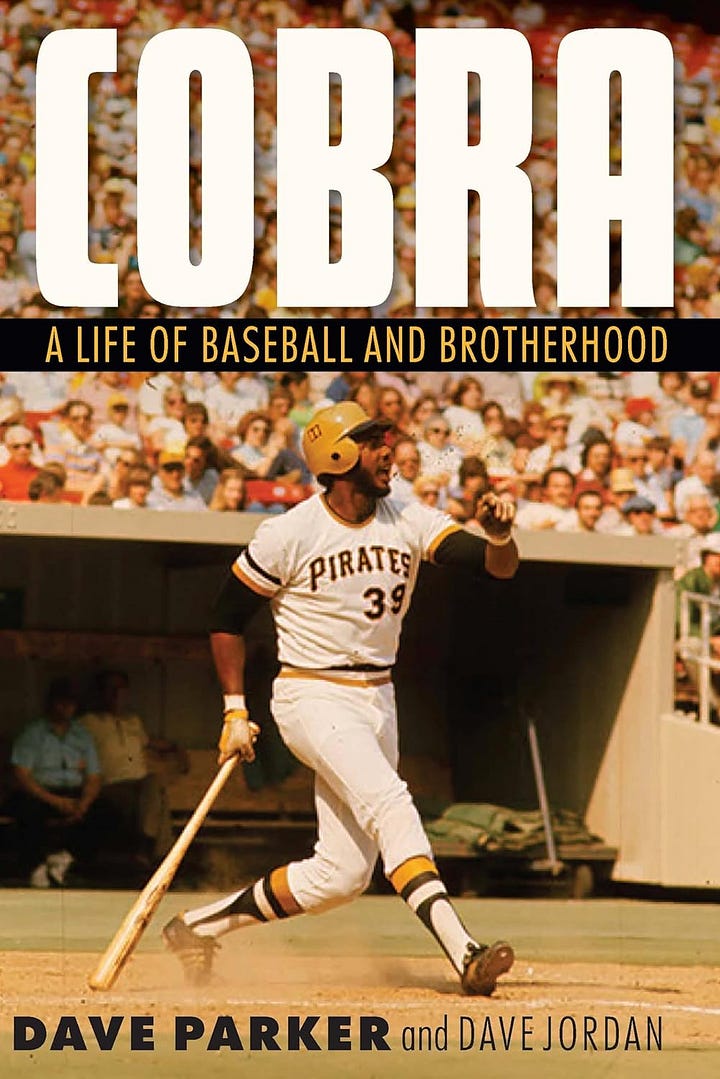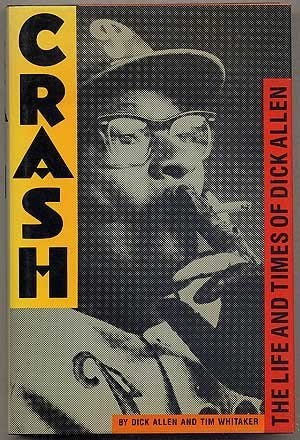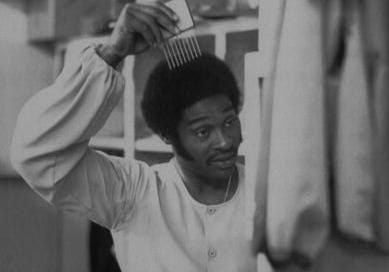Wallopin' and Boppin'
Baseball's Hall of Fame just got exponentially funkier with the addition of Dick Allen and Dave Parker


I’m not exactly sure when it was that I stopped caring about the Baseball Hall of Fame.
I know it had to be a few years before the Commissioner’s Office’s cozying up to gambling interests and racist dog-whistling politicians made me walk away in disgust from MLB altogether. Maybe it had something to do with watching Ron Santo get cruelly and repeatedly shut out of the Hall until he was too dead to enjoy the honor. Maybe it had something to do with seeing a HOF employee that I once respected openly railing on social media against the idea that LGBTQ+ folks deserve to enjoy the same rights as heterosexuals. Or maybe I just got sick of trying to wrap my head around a voting process that could somehow elect Alan Trammell to the HOF while simultaneously leaving his equally deserving double-play partner Lou Whitaker out in the cold.
But even before that, I found the endless arguments over who does/doesn’t belong in the Hall profoundly tiresome. Maybe that’s because I’m a “Big Hall” guy who has little patience for the “NO! ONLY THE BEST OF THE BEST!” blowhards. I believe baseball history would be far better served by celebrating players who made meaningful contributions to the game regardless of whether or not they hit the (frankly arbitrary) benchmarks of 300 wins and/or 3,000 strikeouts (for pitchers) or 3000 hits and/or 500 home runs (for position players). To me, it’s simple: If you consistently performed exceedingly well at your assigned position or task, you should be celebrated for it. Hell, Manny Mota was the greatest pinch-hitter of his era — I’d be totally fine with them enshrining him in the Hall just for that.
They won’t, of course, but that’s okay. Ultimately, baseball history is about a whole lot more than its batting champs, MVPs and Cy Young winners, and I’ve always been much more interested in the guys who brought color and flair to the game: Guys like Mark “The Bird” Fidrych, Dock Ellis, Joe Pepitone, Bill Lee and Oscar Gamble, none of whom put up anywhere near the sort of numbers to qualify them for Cooperstown, but all of whom are firmly ensconced in my own personal Hall of Fame for the enjoyment they brought (and the impact they had upon) me as a fan. I truly believe that one of the reasons my baseball books Big Hair & Plastic Grass and Stars & Strikes touched such a nerve with fans of a certain age is because they joyously celebrated the magic that players like these wove into the fabric of the game, regardless of whether or not they possessed the rare combination of talent, stamina and luck necessary to produce a Hall-worthy career.
Of course, some of the players I celebrated in those books were indeed among the best of their era, even if they weren’t always recognized as such. Which is why, regardless of my present distaste for the Hall of Fame (and MLB), I was utterly elated last night to learn that Dick Allen and Dave Parker have finally been elected for induction.
In addition to having two of the all-time great baseball nicknames — “Crash” and “The Cobra” — both Allen and Parker were heroes of mine from the earliest days of my baseball fandom, which just happened to coincide with the overlap of their respective careers. (Allen played in the majors from 1963-1977, while Parker played from 1973-1991.) Both men were among the most feared hitters of their day, as well as players whose badass swagger and unapologetically proud Blackness really rubbed the old-school sportswriters who covered them the wrong way.
Allen’s tense relationship with the press almost certainly hamstrung his Hall candidacy for decades; ditto for a fiercely independent streak that sometimes manifested in him going AWOL from his team and heading home to his horse ranch in Wampum, PA whenever the bullshit got too thick. Nonetheless, most of his former teammates still speak highly of him to this day, and there’s no question that “The Wampum Walloper” (as he was also known) was an incredible player in his prime.
Allen’s 1972 season — a year when he, Wilbur Wood and Stan Bahnsen almost carried the Chicago White Sox to the AL West pennant all by themselves — is still a mind-blower. In addition to batting .308 that year, Allen led the league with 37 home runs, 113 runs batted in, 99 walks, a .420 on-base percentage and a .603 slugging percentage, while also scoring 90 runs, clubbing 28 doubles and stealing 19 bases. He quite deservedly won the AL MVP award that year, garnering 22 of 25 first-place votes. White Sox skipper Chuck Tanner had such respect for Allen’s baseball knowledge that he would often confer with him regarding in-game decisions, sometimes even letting Allen “manage” the team in late innings. Had Allen been more naturally inclined towards diplomacy, the seven-time All Star might have enjoyed a long post-playing career in the game as a coach or manager.
The gregarious Parker generally had a far more cordial relationship with the press than Allen, but nagging injuries and overindulgence in cocaine at what should have been the peak of his career (and right after he’d become baseball’s first million-dollar-a-year player) kept the two-time batting champ from compiling the sort of stats that would have made him a lock for HOF induction — and also gave the scolds and self-appointed guardians of the public morality in the Hall’s electing body an excuse to not vote for him.
Still, I’ll never forget that late-seventies stretch when The Cobra was unquestionably The Man, a five-tool player and winner of back-to-back NL batting titles and three straight outfield Gold Gloves, who wore a pre-Jason Voorhees hockey mask on the bases so that he wouldn’t further aggravate his broken jaw, and a Star of David pendant on the field because, in his words, “My name is David, and I’m a star!” (Like I said, SWAGGER, baby!) Watching Parker gun down two baserunners from right field during the 1979 All Star Game remains one of my favorite memories from that season.
The news of Allen’s HOF election is admittedly bittersweet; a la Santo, the Hall had multiple chances to enshrine him while he was still alive, but wound up kicking that can down the road until four years after his death at the age of 78. I’m delighted for his family and fans, however, and I’m overjoyed that Parker — who has been struggling with Parkinson’s Disease for over a decade — has lived long enough to see himself get elected to the Hall. Congrats, Cobra; you earned this.
I would also like to congratulate my pal Dave Jordan, who collaborated with Parker on his wonderful 2021 autobiography Cobra: A Life of Baseball and Brotherhood, a book which almost certainly influenced some of the Classic Era Committee folks to vote him in. Like Crash: The Life and Times of Dick Allen, Allen’s 1989 collaboration with Tim Whitaker, Cobra unflinchingly illustrates the many challenges faced by Black players in the game long after MLB was integrated. Both books are incredibly informative as well as immensely entertaining, and I count them among my favorite ballplayer autobiographies.


Of course, it would have been a veritable Big Hair & Plastic Grass HOF trifecta if the late, great, extremely deserving Luis Tiant had been elected this year, as well. Then again, El Tiante (who passed away two months ago) had been repeatedly snubbed by Hall voters in the past, and was quite vocal about wanting to go into the Hall while he was still alive. “I already told my family, ‘They put me after I die, don’t go anywhere. Don’t go to the Hall of Fame, don’t go to Cooperstown, don’t go no goddamn place,’” he told The Sporting News in 2017. “What good is that they put you in after you die? You can’t do nothing with your family and your friends.”
Alas, El Tante was fated to join the ranks of great, charismatic and legendary players whose HOF inductions would have been seriously beneficial to themselves, the Hall and baseball in general if they’d gotten in while they were still alive, but who never got the call during their lifetimes due to politics, old grudges or not having played for enough World Series winners. It’s a goddamn travesty, really.
But rather than leave you on that particular sour note, I’d like to celebrate a couple of musical connections to the new inductees. (This being a music-related Substack, after all.) Though the man looked like the “Theme from Shaft” in human form, Allen had a real flair for sweet, doo-wop-flavored R&B — and he sang it for years as the leader of Philly vocal group Rich Allen & The Ebonistics. Though released in 1968, the earnest “Echo’s of November” sounds like a throwback to 1962 or 1963 at the latest… but of course there’s nothing at all wrong with that.
Parker, on the other hand, wasn’t much of a singer, but — as Cobra details — he was a major music fan. Among other things, his love of P-Funk manifested in him famously showing up in the Pirates locker room early in the 1976 season wearing a custom t-shirt emblazoned with “If You Hear Any Noise It’s Just Me And The Boys Boppin’,” a quote from Parliament’s 1975 jam “Mothership Connection (Star Child)” that was apparently intended to inspire his slumping Pittsburgh Lumber Company teammates to start boppin’ again. Which didn’t work, at least not soon enough to keep Dick Allen and the newly resurgent Philadelphia Phillies from running away with the NL East that year — but then, that’s a story you can read in greater detail in Stars & Strikes, preferably with Parliament playing in the background.
The Hall of Fame’s soul and funk quotient has just expanded exponentially, and that alone is something to celebrate. Don’t know how that’s going to impact this coming summer’s induction ceremonies — but if you hear any noise coming from the direction of Cooperstown, it’ll most assuredly be The Cobra and the spirit of Crash boppin’.




Quite a story about both....I never had the details. Also, while jaded about any and all HOFs for just the reasons you allude to, your positive comments about Allen and Parker's induction was refreshing.
Boy do I miss the baseball of yore - never thought I'd be saying that, making fun of the real old days and their funny mitts when I was a kid in the 70's. Nice trip down memory lane jamming along with "Mothership Connection." Saw Parker play at Wrigley a couple of times, back when it was still known as the Lakeview neighborhood, long before it was Harry Carey's Wrigleyville. Seats were cheap and easy to get, my Grandad thought the bleachers were not a good place to sit. The Cubs just sucked back then but I marveled, and was confused when the Pirates, Big Red Machine or Cardinals came to town and the the place was full - it was a hard lesson to learn that your team pretty much just sucked. It was OK, José Cardenal always cheered me up.